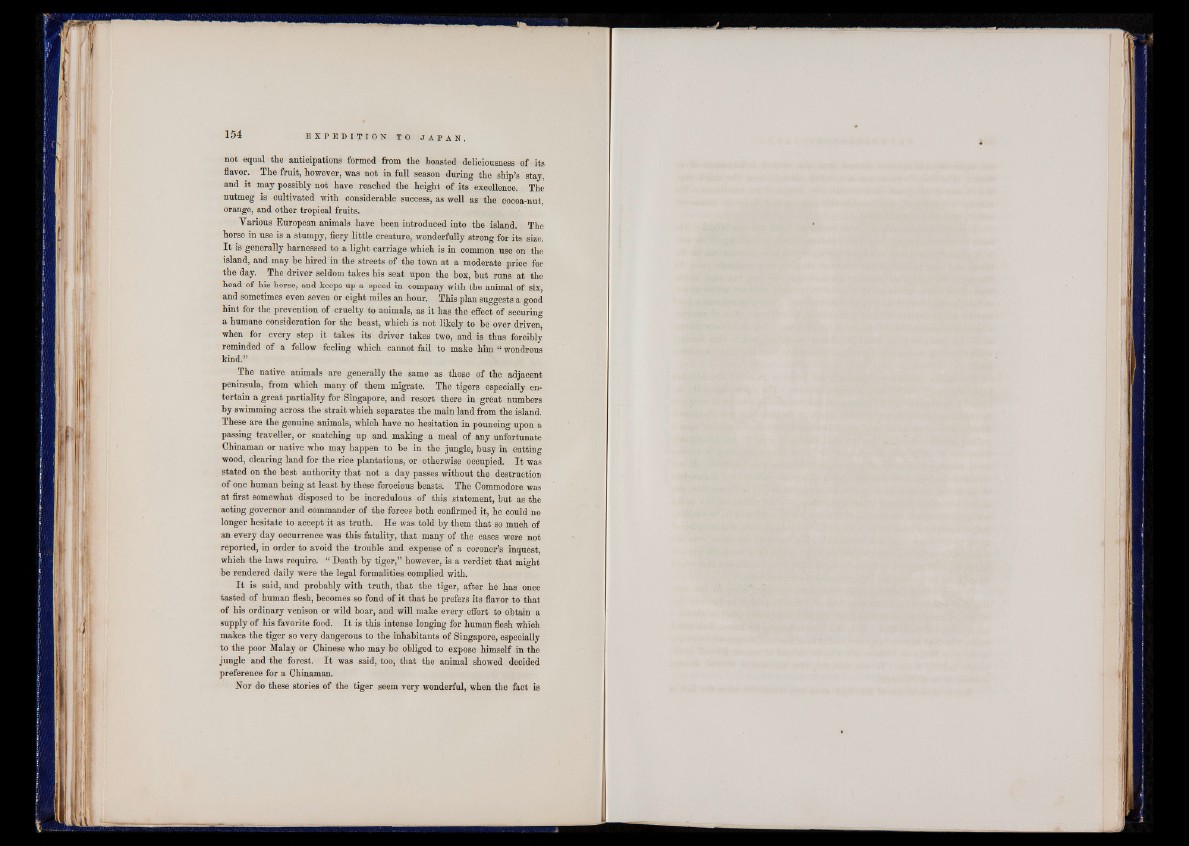
154 E X P E D I T I O N TO J A P A N .
not equal the anticipations formed from the boasted deliciousness of its
flavor. The fruit, however, was not in full season during the ship’s stay,
and it may possibly not have reached the height of its excellence. The
nutmeg is cultivated with considerable success, as well as the cocoa-nut
orange, and other tropical fruits.
Various European animals have been introduced into the island. The
horse in use is a stumpy, fiery little creature, wonderfully strong for its size.
I t is generally harnessed to a light carriage which is in common use on the
island, and may be hired in the streets of the town at a moderate price for
the day. The driver seldom takes his seat upon the box, but runs at the
head of his horse, and keeps up a speed in company with the animal of six,
and sometimes even seven or eight miles an hour. This plan suggests a good
hint for the prevention of cruelty to animals, as it has the effect of securing
a humane consideration for the beast, which is not likely to be over driven
when for every step it takes its driver takes two, and is thus forcibly
reminded of a fellow feeling which cannot fail to make him “ wondrous
kind.”
The native animals are generally the same as those of the adjacent
peninsula, from which many of them migrate. The tigers especially entertain
a great partiality for Singapore, and resort there in great numbers
by swimming across the strait which separates the main land from the island.
These are the genuine animals, which have no hesitation in pouncing upon a
passing traveller, or snatching up and making a meal of any unfortunate
Chinaman or native who may happen to be in the jungle, busy in cutting
wood, clearing land for the rice plantations, or otherwise occupied. I t was
stated on the best authority that not a day passes without the destruction
of one human being at least by these ferocious beasts. The Commodore was
at first somewhat disposed to be incredulous of this statement, but as the
acting governor and commander of the forces both confirmed it, he could no
longer hesitate to accept it as truth. He was told by them that so much of
an every day occurrence was this fatality, that many of the eases were not
reported, in order to avoid the trouble and expense of a coroner’s inquest,
which the laws require. “ Death by tiger,” however, is a verdict that might
be rendered daily were the legal formalities complied with.
I t is said, and probably with truth, that the tiger, after he has once
tasted of human flesh, becomes so fond of it that he prefers its flavor to that
of his ordinary venison or wild boar, and will make every effort to obtain a
supply of his favorite food. I t is this intense longing for human flesh which
makes the tiger so very dangerous to the inhabitants of Singapore, especially
to the poor Malay or Chinese who may be obliged to expose himself in the
jungle and the forest. I t was said, too, that the animal showed decided
preference for a Chinaman.
Nor do these stories of the tiger seem very wonderful, when the fact is